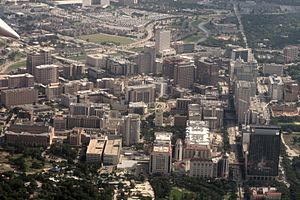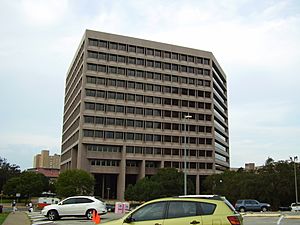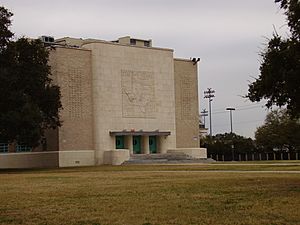Education in Texas facts for kids
Texas has over 1,000 public school districts. Almost all of these districts are "independent," meaning they operate separately from city or county governments. These school districts can even cross city and county lines. Independent school districts have the power to collect taxes from people living there and can use eminent domain for property needed for schools. The Texas Education Agency (TEA) helps oversee these districts and provides extra money. However, the TEA mostly steps in when a school district isn't doing well.
Texas is home to 36 public universities. Most of these belong to one of the six state university systems. The Carnegie Foundation, which studies universities, says that 11 Texas universities are top research schools. These include Rice University, The University of Texas at Austin, Texas Tech University, University of Houston, University of North Texas, Texas A&M University, University of Texas at Dallas, University of Texas at El Paso, University of Texas at Arlington, Baylor University, and University of Texas at San Antonio.
Contents
Medical Research in Texas
Texas has many important medical research centers. The state has eight medical schools, three dental schools, and two schools for eye doctors (optometry). Texas also has two very special labs, called Biosafety Level 4 (BSL-4) labs. These labs are designed to safely study the most dangerous germs. One is at The University of Texas Medical Branch in Galveston, and the other is at the Southwest Foundation for Biomedical Research in San Antonio. The San Antonio lab was the first privately owned BSL-4 lab in the United States.
The Texas Medical Center in Houston is the largest collection of research and healthcare places in the world. It has 45 different organizations working together. More heart transplants happen here than anywhere else globally. San Antonio's South Texas Medical Center is also highly ranked for its medical research. The The University of Texas M. D. Anderson Cancer Center is a world-famous place dedicated to helping cancer patients, doing research, and teaching about cancer prevention.
Learning in Texas Schools
Texas has over 1,000 school districts. They range in size from very large, like the Houston Independent School District, to very small, like the Divide Independent School District which once had only eight students! As mentioned, almost all Texas school districts are "independent." This means they are separate from city governments. They are often called "ISDs" for short. These districts can collect taxes from local residents and use eminent domain to get land for schools. The only exception is the Stafford Municipal School District, which serves the city of Stafford.
The Texas Education Agency (TEA) oversees public schools and charter schools. Because school districts are "independent," the TEA's power is somewhat limited. The TEA divides the state into 20 "Educational Service Center regions" to help local schools. The Robin Hood plan is a system that helps share school funding fairly. It takes property tax money from wealthy school districts and gives it to districts with less money. This helps all schools in Texas have similar funding.
Texas also has many private schools, especially in big cities. These include non-religious schools, Catholic schools, and Protestant schools. The TEA does not control private schools. Private schools don't have to be officially approved (accredited), and their students don't have to take state achievement tests. However, many private schools choose to get accreditation and have students take tests. This shows parents that the school cares about education.
Texas is known for being one of the easiest states to home school in. The TEA and local school districts do not control home schooling. State law only requires that home school lessons teach reading, spelling, grammar, math, and good citizenship. The lessons must also be taught in a proper way. There are no rules about how many days or hours must be spent learning. Also, home-schooled students don't have to take achievement tests when they graduate. Home schooling was challenged in Texas, but a court case called Leeper v. Arlington ISD decided that home schooling is legal. It also said the state has little power to control it.
As of 2010, about 49% of students in Texas public schools (Pre-K through 12th grade) were Hispanic. From 1999 to 2009, Hispanic students made up 91% of the growth in Texas public schools. The total number of students grew by over 856,000, and more than 775,000 of those new students were Hispanic.
School Lessons and Books
The lessons taught in Texas public schools are set by the Texas Essential Knowledge and Skills (TEKS). These are updated by the Texas State Board of Education (SBOE). Texas has not adopted the Common Core State Standards Initiative, which is a set of learning goals used in many other states. The State Board of Education also chooses the textbooks used in public schools. Because Texas is a large state, many other states also use textbooks that were first developed for Texas schools.
Textbook Fairness
Social studies textbooks and lessons in Texas have sometimes been criticized. Some say they have a conservative Christian viewpoint. They have also been criticized for not always being fully accurate about history and religions. For example, the American history lessons teach that Moses was an important influence on the Founding Fathers. A 2014 report also found that proposed American history textbooks sometimes played down the importance of conquest and slavery. They also gave an incomplete view of LGBT people and Native Americans. They also praised laissez-faire capitalism too much. The people on the SBOE panels who choose textbooks are often not teachers or academics. They are chosen in elections where not many people vote.
In 2021, the state passed Texas House Bill 3979. This law bans the teaching of critical race theory. Some groups, like the American Historical Association, worried that the law was too broad. They feared it might cause schools to leave out or change important topics about race or gender in social studies. For example, the school board in the Carroll Independent School District faced criticism. They said that books about the Holocaust might need to be balanced with "other perspectives" because of the new law. However, education experts and the district's superintendent disagreed, saying the law would not affect the factual accuracy of teaching materials.
The science lessons adopted in 2009 were the first to fully include the theory of evolution. But there was some disagreement because the final version allowed schools to teach creationism instead of evolution. The current science lessons from 2017 do not require teaching evolution over creationism. However, they removed language that seemed to discourage teaching evolution.
State Tests
The State of Texas Assessments of Academic Readiness (STAAR) are a series of standardized tests used in Texas schools. These tests check if students have learned the reading, writing, math, science, and social studies skills required by Texas education standards. Pearson Educational Measurement develops and scores these tests, with close help from the Texas Education Agency. The STAAR tests were created before the No Child Left Behind Act was passed, but they follow its rules. They replaced the old test, called the Texas Assessment of Knowledge and Skills (TAKS), in 2003.
Images for kids

















